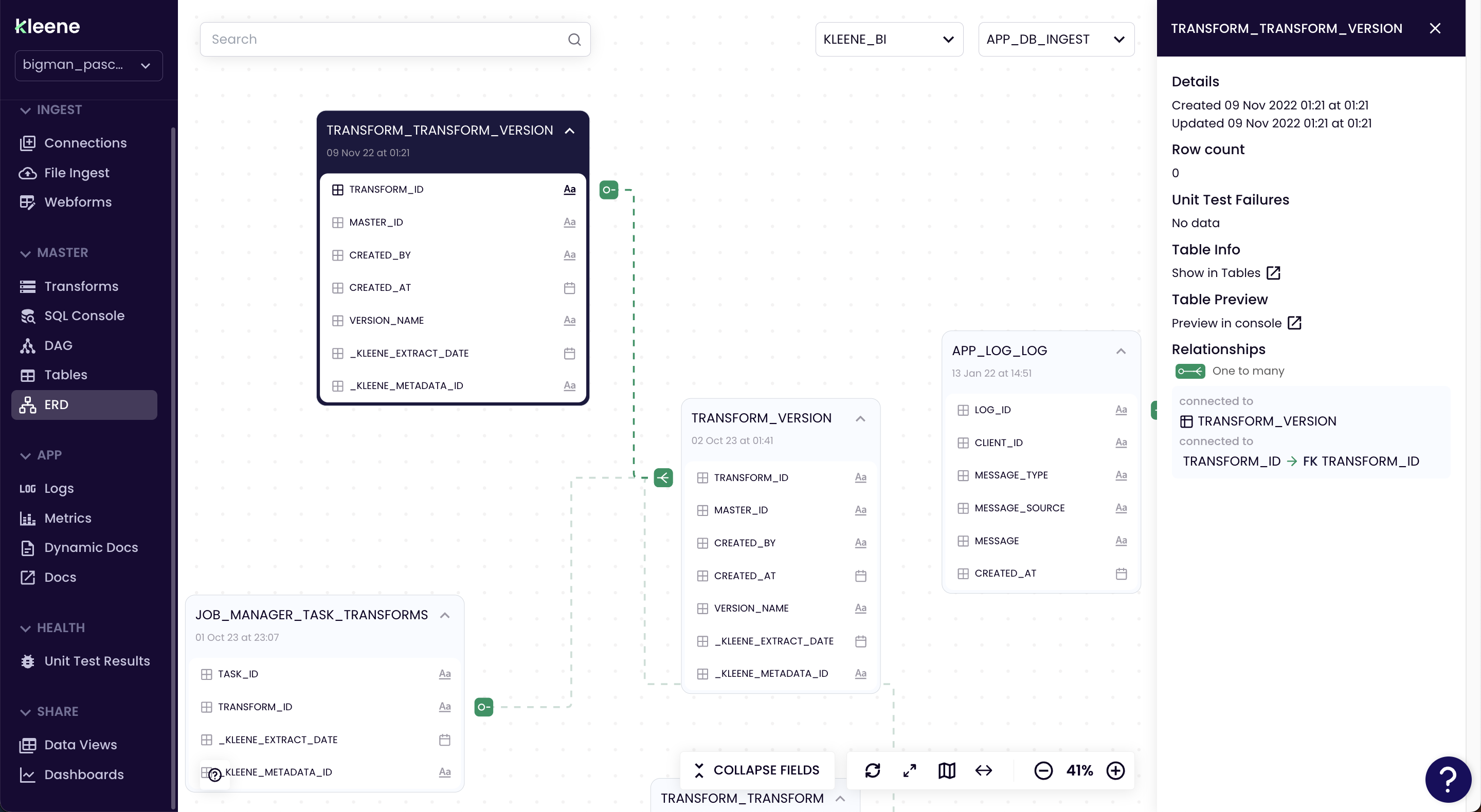In the complex world of data management, understanding and visually representing data models is essential . It's like having a detailed map when navigating a complex city: without it, even the most experienced traveller might get lost. Just as a city's blueprint offers clarity to its complex network of streets, an Entity-Relationship Diagram (ERD) provides a clear and organised snapshot of the sprawling data universe. Such visual tools are not just nice-to-have; they are integral in ensuring that businesses can operate efficiently, exploiting the true power of their data.
Businesses, both big and small, are continually seeking ways to optimise their data management processes and enhance the understanding of their data. ERDs can really help in this mission, offering a straightforward and intuitive way of visualising what data is available and how it is related
That is why we're thrilled to unveil Kleene.ai's latest innovation: The launch of an ERD feature into our platform. In this article, we'll navigate through the essence of ERDs, their benefits, and how Kleene.ai's ERD can improve data visualisation and collaboration.
What is an Entity-Relationship Diagram (ERD)?
At its core, an ERD is a graphical representation of the data stored in a database. It lays the foundation for the database's design, outlining entities, their attributes, and the intricate relationships between them.
Why is ERD Indispensable?
1.Streamlining Communication:
A picture is worth a thousand words", holds profound truth in the data world. ERDs, with their clear portrayal of entities and relationships, enable teams to understand the intricacies of a data model effortlessly. Both business and technical individuals can engage in productive dialogues using the ERD as their universal language.
2. Enhancing Collaboration:
The digital era has ushered in a paradigm shift in team interactions. No longer confined to a meeting room with a whiteboard, teams scattered across the globe require robust tools for collaboration. Modern ERD tools offer this precise solution. Every team member, irrespective of their location, can work with, track, and contribute to the ERD.
3.Trouble-shooting with Ease:
Databases are not immune to hiccups. With a diligently documented database design rooted in a current ERD, diagnosing and resolving issues become substantially simpler. Before tweaking codes, it's imperative to consult the ER model to determine if database modifications are required.
Kleene.ai's ERD: A Leap Forward
Kleene's users have always been adept at building data models that mirror their business operations, enabling swift report generation. This modelling involves tables, columns, and relationships. However, until now, this data model was a mental construct for data teams. The introduction of the ERD feature revolutionises this approach.
Benefits to Kleene's Users:
For business Teams:
The ERD offers a panoramic view of the data available for reporting. It shows visually how data dispersed across tables is connected, thereby streamlining reporting processes.
For Data Teams:
With the ERD, data teams receive a holistic overview of their data model. This visualisation enables them to anticipate the ramifications of any alterations or additions to the data pipelines.
Bridging the Gap:
The ERD serves as a tangible interface between the reporting and data teams. It grounds discussions, fostering clearer communication and collaboration for new reporting requirements.
Conclusion
In the complex world of data, the necessity for tools that enhance understanding and collaboration cannot be overemphasised. Kleene.ai's latest integration of the ERD feature is not merely an addition to our platform, but a significant advancement towards democratising BI reporting for users across different roles.
By providing a clear, visual representation of data structures and relationships, the ERD enable professionals with an ability to better understand their data. Such clarity can lead to better decision-making, as teams are equipped with a holistic view of the data ecosystem. This, in turn, has far-reaching implications, from more accurate and efficient report generation to quicker problem diagnosis and resolution.
In conclusion, the launch of ERD by Kleene.ai isn't just about offering another feature. It's a testament to our commitment to providing user-centric solutions that simplify complex processes and promote collaborative efforts. Talk to a data expert today to learn more about ERD and how Kleene.ai can help you get more value out of your data.




